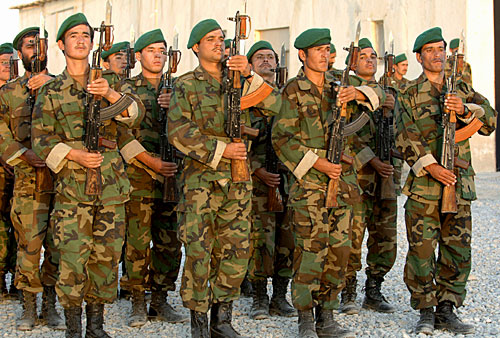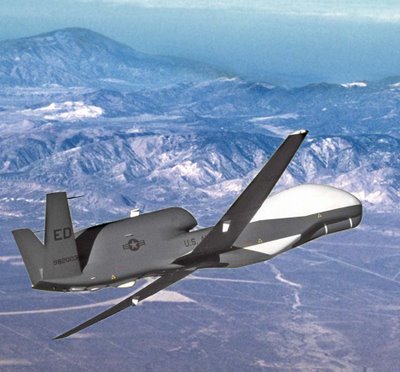
As American strategies for Afghanistan and Pakistan (AfPak) come to fruition, a premium must be placed on articulating what a stable civil society will look like for each state. This may sound like an obvious step in any plan to stomp out terrorist safe havens abroad, but two tactics that Administration officials are entertaining in the region strongly beg the question as to whether President Barack Obama is placing a premium on security, at the expense of government stability.
AFGHANISTAN
First, let's look to Afghanistan. Last week, senior Pentagon officials outlined a proposal, likely to be enacted by Obama, which would expand the size of Afghan security forces. Presently boasting more than 90,000 troops in the army and 80,000 police officers, the expansion would more than double the current size of security forces. Investing in a goal of approximately 400,000 troops and officers nationwide would also run up a tab of over $2.5 billion annually for the next six years.
Sheer magnitude of cost projections aside the undertaking, would function as an explicit endorsement of the defense apparatus in Afghanistan to regain stability in the Taliban-riddled region, over the central government. Senior Administration officials even spoke of the proposal to the New York Times in terms of it being able to, "fill a void left by the central government and do more to promote stability in the country." But in a country that was once liberated under the pre-tense that it needed an inclusive civil society by the people and for the people, simply putting more combat boots on the ground is not a sufficient means to promote governmental stability.

While current President Hamid Karzai faces charges of incompetence and corruption, investing into the armed services at the rate two times the annual operating budget for the entire Afghan government leaves present concerns about political stability in the region unchecked. That coupled with the upcoming, August elections demand that if we are to ensure a sustainable, civil society in the region, Obama must put stock behind politically engaging the region in conjunction with training and growing their security forces.
While an expanded professional army will serve to quell a mounting Taliban insurgency, bolstering, a veritable central government is also required to ensure that the fate of Afghanistan still lies with the people (not with the Ministry of Defense). This is important for two reasons. First, empowering the civilian government allows for a balance of power between political security and military security. This helps the West ensure that expanding the Afghan National Army does not crowd out or preempt a civil society, accidentally propping up a military or police style state. Secondly, integrating clear civilian command from the outset would ultimately help foreign troops seamlessly hand off power, creating an exit strategy. As a March 2009 report from the International Crisis Group points out, "Reform of the Ministry of Interior should...be a priority, with greater civilian oversight over police reform. Emphasis must shift from using the police to fight the insurgency to using it to fight crime and reinforce law and order. Tangible steps include appointing a career police commissioner and establishing community liaison boards."
The same sort of integrated political and military cultivation is what helped General David Petraeus navigate the murky waters of an Iraq insurgency while harnessing support for the Prime Minister. Obama even pointed out the necessity of this approach, in an interview with CBS TV's "60 Minutes," saying, "What we can't do is think that just a military approach in Afghanistan is going to be able to solve our problems." If Obama does not heed his own advice, and goes "all-in" on this lopsided approach, the Administration runs risks of: having to support an engorged military in the central Asian mountains; a trained and disproportionately empowered military engaging in illegal narcotics or arms trades; a population doubting if an international troop presence actually strives to sustain a civil society or if short term security gains are paramount; protests that the army is not representative of all sectarian groups; and segments of the military challenging and undermining the authority of the regionally elected Afghan leadership.
Instead, Obama should express concerns about the way in which Karzai has been handling matters face to face and work with the government to build regional coalitions in various provinces. Additionally, when Secretary of State Hillary Clinton attends the "International Conference on Afghanistan" in The Hague at the end of this month, she must open up a working dialogue with Afghan Minister of Foreign Affairs Rangin Dadfar Spanta, and Foreign Minister Verhagen to detail what responsibilities US troops and the Afghan National Army will undertake, and what role provincial and central governments should play.
PAKISTAN
But the risky tactic of placing a premium on security, at the expense of government stability is not an idea being entertained for Afghanistan alone. Questions of undercutting sovereignty and a respect for a civil society are starting to emerge in abutting Pakistani provinces as well. Since the late summer of 2008 the United States has strategically and persistently made it rain in the Federally Administered Tribal Areas (FATA). And I don't mean the cool kind of cash-money "rain" that Fat Joe harmonizes about. We're talking missile rain by pilotless Predator and Reaper drones.
Assuming one of his more hawkish postures in foreign policy, President Obama has sustained Bush Administration orders to strike & execute handfuls of Taliban and Qaeda leaders in the FATA, much to the Pakistani people's chagrin.
Now the Administration is considering expanding the strike radius far beyond the turbulent tribal terrain of the FATA and into Baluchistan, a Pakistani controlled province, given fears that drone strikes in the north have displaced and forced militant leaders to flee southbound into cities like Quetta (the capital of Baluchistan).

Our practices have been stomached so far since the strikes have been contained inside tribal areas, only nominally under Pakistani authority, and thus have not been seen as a severe affront to sovereignty. But the Pakistani people and President Asif ali Zardari have protested that such incursions pose a threat to Pakistani sovereignty and belittle its ability to manage its own security breaches. Repeated calls, however, for Pakistan to take out militants in terrorist strongholds (on account of actionable intelligence) have rarely yielded results. In turn, the Obama administration values the approach as it allows the CIA to cross names off its list of hostiles.
Nevertheless, the drones have not drowned out the voices calling for the respect of Pakistani sovereignty. By continuing to carry out air strikes, the US is put on thin ice with the Pakistani people and government--already plagued with political turmoil. As Isobel Coleman, Senior Fellow at the Council on Foreign Relations underscores, "These strikes are not a strategy and no one would say they are a long term solution. They are destabilizing to the Pakistani government, and create new cadres of militants." The Administration should also take notice that the very people pushing the buttons have expressed fears that the collateral damage and displacement from the drone strikes are rallying and uniting the citizenry around an anti-American mindset. But if drone strikes continue to displace surviving terror suspects by pushing them further and further south, there is little guarantee that national security advisors won't vie to correspondingly expand the strike radius further onto Pakistani soil.
And skepticism of that is apparent at home. As an Administration official cautioned, "...with the targets now spreading, an expanding U.S. role inside Pakistan may be more than anyone there can stomach." While this may take out a few militants, expanding these strikes: undermines the sovereignty of our most important regional ally in the War on Terror, brews animosity against the West, creates a slippery-slope in terms of how deep into Pakistan-proper the strikes need to go and in turn boosts the propensity for collateral damage. Islamabad CIA station chief, Milton Bearden, even noted that, "Unless we come up with a coherent Pakistan policy, then nothing works."
If the Obama administration continues the covert strikes, it must start to place more stock behind the government and people of Pakistan if it is to ensure long term sovereignty and governmental stability. This means open discussions with Zardari on how to collaborate with the Pakistani military to root out Taliban/Qaeda fighters and even possible conversations with opposition leader Nawaz Sharif to see how reign in restless factions. By consolidating governmental control over its own national security policy, supporting political reform in FATA and strictly monitoring aid, the US will help empower the civilian leadership to implement its own policy preferences in an already fragile democracy.
Maintaining these dynamic conversation help ensure that military arms will not eclipse the people's voice and stake in the government, and that incumbent leaders are not undercut by the meddling of an international troop presence; both being key ingredients to sustain long term civil societies. There is no question that security gains are important to stabilizing the AfPak region but Barack Obama has repeatedly signaled his desire for more conversations with players around the world, in hopes of a more multilateral foreign policy posture. The audacity of that kind of hope begins by empowering and collaborating with these regional governments as military solutions are only one part of the equation.
Thanks to Isobel Coleman, Thomas Brugato, Andrew Hopkins, Dr. Arun Ananth Aiyer and Claire Lehman for contributing insights to this article.
